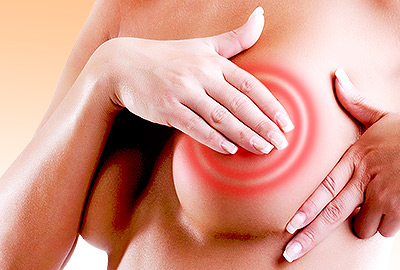Breast and vaginal pain are two conditions that can occur as a result of menopause, although it is possible for them to happen at any age. They are irritating and uncomfortable conditions that can affect intimacy with your partner, and this can sometimes put a strain on relationships. It can be uncomfortable to talk to a partner about suffering from breast and vaginal pain, but it is an important discussion to have. Keep reading to find out how you can broach this subject with your partner.
What Is Breast Pain?
This is a relatively common complaint, with around two thirds of women experiencing it at some point in their lives, and reasons can be hormonal or physical. Hormonal pain tends to come at certain points in a woman's life that are characterized by estrogen fluctuations, such as during menstruation or menopause. Pain can range from anything between mild to severe breast tenderness.
What Is Vaginal Pain?
Vaginitis is inflammation of the vagina, which normally manifests itself as a painful soreness or swelling. It is often accompanied by abnormal discharge, itchiness, and discomfort during sex or urination.
However, as well as a result of vaginitis, pain can sometimes be a result of vaginal dryness, which is a common symptom of menopause. The lack of lubrication can result in a burning or itchy sensation. Vaginal dryness is mostly related to hormonal imbalance, but vaginitis can be caused by a number of things, such as bacterial or fungal infections (e.g., chlamydia), chemical irritation (e.g., from cosmetics), or even something more serious.
Why Should I Talk to My Partner?
Talking to a partner is first and foremost important for your own peace of mind. Breast and vaginal pain can result in anxiety and low mood, and simply sharing your feelings with another person will help prevent these physical conditions having a negative effect on your mental state.
Furthermore, the psychological effects of a lower libido can cause you to become withdrawn and distant, driving a wedge between you and your partner if they are unaware of the reasons behind this emotional change.
Of course, aside from these emotional reasons, it is essential to talk to your partner- if your pain is indicating a another infectious condition, it is important for both of you to get medical attention as soon as possible.
How Do I Approach the Subject?
Approaching the subject can feel awkward, but will result in more intimacy and understanding between you and your partner.
Outside the bedroom
It would probably help to have the conversation outside of the bedroom, so that the environment does not feel so pressured. Work out what you are going to say beforehand - this way, it is not as tempting to bail on the conversation halfway through.
To the point
Often, it helps to begin by sticking to the bare facts, rather than being emotional about it. A conversation starting with dry facts will often naturally turn into a more intimate conversation, but don't try to force it from the offset.
Be calm
If you are really worrying about the conversation, it can help to take a bit of time to try and work out why. It could be down to natural shyness, or maybe you have been brought up to not talk about such personal problems, so it feels awkward. It could even be because you fear your partner's reaction. Knowing exactly what you want from the conversation and why you are reluctant to talk can help you break the problem down and overcome it.
Being open about discussing personal topics with a partner can increase intimacy and help you both work through any sexual or relationship problems it might cause. Talking to a doctor beforehand and arming yourself with the facts can often help reduce the anxiety of discussing breast and vaginal pain with a partner. Read more on choosing the right bra for breast pain.
Sources
- Breast Cancer Care. (2013). Breast pain. Retrieved September 16, 2014, from http://www.breastcancercare.org.uk/breast-cancer-information/benign-breast-conditions/breast-pain#noncyclical
- National Breast Cancer Foundation. (2012). Breast Pain. Retrieved September 16, 2014, from http://www.nationalbreastcancer.org/breast-pain
- National Health Service UK. (2013). Vaginitis. Retrieved September 16, 2014, from http://www.nhs.uk/conditions/vaginitis/Pages/Introduction.aspx
- National Institutes of Health. (2012). Breast - premenstrual tenderness and swelling. Retrieved September 16, 2014, from http://www.nlm.nih.gov/medlineplus/ency/article/003153.htm
- U.S. Department of Health and Human Services. (n.d.). STD Testing: Conversation Starters. Retrieved September 16, 2014, from http://healthfinder.gov/HealthTopics/Category/health-conditions-and-diseases/hiv-and-other-stds/std-testing-conversation-starters




